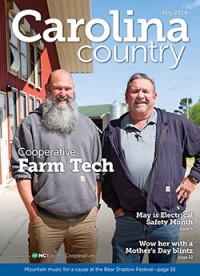One Year Later: What Utilities Learned from Winter Storm Elliott
NC electric cooperatives are investing in resources to ensure a reliable grid
By Amadou FallLast December, as families were settling in for the Christmas holiday across the country, a wide-ranging storm, Winter Storm Elliott, changed plans for many. The sudden peak in demand for power caused by extreme cold temperatures created electricity capacity issues for utilities from Colorado to the East Coast.
Here in North Carolina, Duke Energy implemented rolling service disruptions for the first time in its history, affecting thousands of electric cooperative members — if you weren’t directly affected, you likely knew someone who was. Providing reliable access to power is a fundamental part of our job, and North Carolina’s electric cooperatives are working together to do so at the lowest possible cost. New grid technology such as battery energy storage systems and our existing generation assets helped us manage the challenges of last year’s winter storm, but lessons were learned that electric co-ops and the larger electric utility industry have worked diligently to address over the past year. First, electric utilities took a look at how power is being used, how that’s changing and how our expectations for providing power need to change as a result. A big part of what we do at the North Carolina Electric Membership Corporation (NCEMC), which provides power to 25 electric cooperatives in North Carolina, is forecast what power will be needed to meet future demand. We plan for everything from bad weather to how folks will use more power after getting home from their daily commute. Past trends are a big part of these forecasting tools, but past trends don’t always account for the new ways in which people are using energy.
We’re also investing in more of the resources that helped keep power available during last year’s storm...
For example, a growing number of North Carolina homes are using electric heat pumps (42% of all NC homes in 2022, second only to South Carolina). That’s wonderful for homeowners, because heat pump technology works well in our climate and can be more efficient than other HVAC options. But it also means utilities need to be prepared to meet an increased demand for power when temperatures drop and new electric heat pumps — which may not be accounted for in past trend data — switch on to keep homes warm.
Learning from last year’s winter storm, utilities have upgraded load forecasting tools to better account for how power is being used today, as well as more precisely predict the performance of smaller sources of generation spread across the grid, like solar and batteries.
Additionally, over the past year regulators have required electric utilities to better winterize their systems. During last year’s winter storm, NCEMC’s duel-fueled power plants (able to use natural gas and fuel oil) continued to operate at full capacity because we had fuel oil available when natural gas supply became constrained. Natural gas supply lines, some even hundreds of miles away, froze and limited the amount of fuel available when it was most needed. Utilities are going into this winter with new plans in place, making changes to equipment so it will operate better in extreme cold.
What’s more, North Carolina’s electric cooperatives have studied Winter Storm Elliott and made changes to our own processes, improving coordination with other utilities, including Duke Energy, during peak demand events. We’re also investing in more of the resources that helped keep power available last year, such as energy storage systems and microgrid technology like that being used on Rose Acre Farms (see page 7).
The way our communities are using electricity is changing, and that’s a good thing. But as last year’s storm proved, we need to account for all factors and collaborate in planning for future energy needs. North Carolina’s electric cooperatives are doing just that to ensure we provide members with reliable, affordable power, regardless of what the future brings.
About the Author
Amadou Fall is COO of the North Carolina Electric Membership Corporation.-
More viewpoints
-
Share this story:






